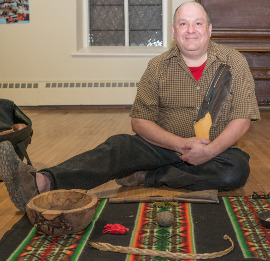 Canada’s treatment of Indigenous people is a complex social issue riddled with twists and turns on the political and legal landscape that seemingly has gone nowhere. Yet, Ojibwe traditional teacher Glenn Trivett has faith in people, and, while he has less faith in government leaders, he presses on, delivering lecture series on faith that knowledge leads to understanding and understanding moves people intellectually and emotionally to new levels of action.
Canada’s treatment of Indigenous people is a complex social issue riddled with twists and turns on the political and legal landscape that seemingly has gone nowhere. Yet, Ojibwe traditional teacher Glenn Trivett has faith in people, and, while he has less faith in government leaders, he presses on, delivering lecture series on faith that knowledge leads to understanding and understanding moves people intellectually and emotionally to new levels of action.
Glenn met with Meaford community members during a three-part series at the Meaford Christ Church Anglican in February. He shared the knowledge he has gleaned from his studies with Odawa spiritual leader Eddie King.
Glenn is the coordinator of the Cultural Resource Co-ordinator of the M’Wikwedong Native Cultural Centre in Owen Sound.
The three-part series included a a traditional medicine ceremony, a review of the history of early European contact with Indigenous people during the colonization period and resulting treaties, the historical context of the Indian Act, residential schools, the White and Red Papers of the 1990s, recent residential school reconciliations, and ongoing social, legal, and infrastructural battles.
“The history of the Indigenous people of Turtle Island (North America) before colonization is a rich history,” Glen says. “Most often, when people hear the history they are moved intellectually and they are moved emotionally to take action. People ask me: ‘Tell me more. Where do we go to from here? What can I do?’
“I say to them: ‘Tell me what skills you have? What resources do you have? There are a lot of Indigenous youth in your communities who feel trapped. How can you reach out to them?’”
Both Glenn’s series and recent books that Lindy Iversen has read have made her feel uncomfortable and ashamed, however she says, “It’s time for non-Indigenous people to step out of their comfort zone.
“Glenn’s series stirred a sense of collective guilt. I was shocked hearing Glenn list all of the restrictions imposed under the Indian Act of 1876 – no land ownership, no lawyers, no vote.”
The Indian Act of 1876, Glenn explained, forbade traditional religious ceremonies and the use of traditional language. A non-Indigenous person seeking post-secondary education was required to enfranchise, that is, forfeit native status.
“I certainly have a new perspective, Lindy says. “When the opportunity presents itself, I will speak up and speak with new insight.
“I do hope I can do something of value.”
Photo: Ojibwe traditional teacher Glenn Trivett met with Meaford community members during a three-part series at the Meaford Christ Church Anglican in February. Glenn shared the knowledge he learned from his studies with Odawa spiritual leader Eddie King. Above: Glenn displays some of the essential items to a medicine ceremony, including sage, sweetgrass, a tobacco pouch, and cedar.











